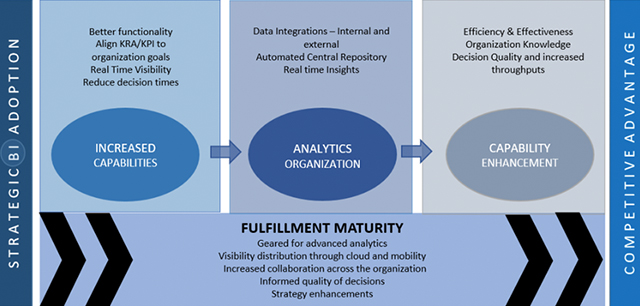Business intelligence for SMEs…driving competitive advantage

Business Development
270 week ago — 8 min read
Background: Business Intelligence tools such data anayltics can benefit SMEs in their decision-making process. Savio Fernandez explores the factors that hold small businesses from fully leveraging such technologies and why they must overcome these barriers.
Working with SMEs is challenging and exhilarating at the same time. The complexities of running a small businesses are immense. The battle being waged is both in winning work as well as in delivering it. The main agenda for SME owners is to pack in more work in a single day, make every currency unit work to its optimised economic value, focus on efficiency in sales, production and delivery. Every owner tries to maximise their output in the hopes of making the organisation profitable quickly.
In a highly charged and time constrained environment the SME owner is looking for instant solutions and therefore holds little or no inclination to evaluate technologies that are time consuming and present deferred results. This is precisely the reason why several SMEs abstain from exploring data/business analytics as a beacon for solutions unlike their corporate counterparts.
This is not to say that SME owners don’t understand the value of data driven insights but rather think it isn’t for them.
SME owners are aware of every change/opportunity in the business. Their decision conundrum is, why invest in technology that tells them what they already know. The lack of inclination in adopting Business Intelligence (BI) tools can be attributed to lack of visibility on total perceived value & benefits.
So what then, can make SME owners take the plunge to invest in a Business Intelligence (BI) programme for their organisations?
To answer the question, we need to explore how BI can help SME entrepreneurs and we need to understand the challenges SMEs face when they set out to use such BI tools.
Lack of inclination
SME owners are aware of every change/opportunity in the business, and so, their decision conundrum is, why invest in a technology that tells them what they already know. The lack of inclination in adopting BI tools therefore can be attributed to lack of visibility on total perceived value and benefits.
Talent and resources
SMEs are generally understaffed and usually compromise on talent in support activities. IT not being one of the primary activities in the value chain especially for non-IT based SMEs, exposes lack of technical expertise. Handling security, data-integration, database and server maintenance, making reports and dashboards is challenging in such an environment.
Also read: Why are companies outsourcing data analytics?
Costs and complexity
When SMEs do evaluate the market for BI tools, they are invariably guided or are self-inclined to the full stack of BI tools, thereby leading to a decision almost unopposed as being too expensive and too time consuming.
We believe the answer lies in value and returns, i.e. value derived (qualitative) and returns generated (quantitative). Using the value/return perspective the SME owners can better understand, the transition of a strategic BI adoption to competitive advantage, thereby getting clearer visibility on total gains.

Increased capabilities
The greatest challenge to an SME owner is to use time effectively and a BI solution does just that. It is not only easy, but also time saving for entrepreneurs to access relevant data (sales figures, contact lists, product/service performance etc.) quickly, run analytics and make business decisions. It helps the SME owner automate most of the tasks in the business and helps them speed up on critical business decisions enabling their enterprise to be more profitable and accelerate business growth.
Analytics organisation
A SME should look at stage wise implementation (including all aspects of business performance in the first phase) of a BI programme to reduce both, the costs and gradually build competent resources to manage their BI objective. This approach allows the business to learn while moving ahead in their BI adoption journey. The further stages can then look at more complex functions (cooperation, collaboration, financial analytics, SEO, web analytics ICT (Information, Communications and Technology) management, customisation, enhanced visualisation etc.).
Also read: Analytics Portfolio from Business Goals & Strategy
Capability enhancements
Rapid adoption, availability of the internet and progressive mobile penetration, has given SMEs unprecedented opportunities in accessing and using data in real time. It builds the organisations knowledge over a period of time facilitating automation, benchmarking (within and outside), and driving efficiency (measures through KPIs). Above all a good BI programme helps the organization in integrating continuous learnings into their strategy making and refining. Enabling the organization to craft strategies at a macro level but translating it with policies and tasks that can be understood at the functional level entwined into their BI program for real time monitoring and effectiveness. The future development can drive performances with outputs from scenario generators, predictive models and interactive visualisations.
Using the above model for understanding business intelligence tools SMEs can get a clear visibility of both short term and long-term benefits.
Adopting the right BI programme for the company is crucial in the success of the programme itself. Just a few things a SME owner should keep in mind:
- A BI tool is only as good as the data it accesses. Data veracity, validity and entirety is crucial to see gains from a BI tool.
- The interface is extremely important and should be intuitive and easy to use.
- Compatible to work with limited IT skills.
- Simple feature inclusions like drop down, slicers, filters, embedded links to ease segmenting, viewing and comprehending data in meaningful terms.
- Look for a cloud based and mobile friendly BI tools.
- And evaluate intelligently the best match for required licensing and subscription fees.
There are a lot more do’s and don’ts but those listed above, I suppose are key to selecting your BI product. Nothing will surpass getting your research right. Evaluate the tool going through each drop down list and correlating it with your business needs with a 'do I need it' or 'I don’t need this' or 'I need something that can help me with this but it isn’t on the select list'.
Connect with me to further explore how, why and when SMEs must embrace business intelligence tools.
Also read: How to build a strong bias for digital transformation
Image source: shutterstock.com
To explore business opportunities, link with me by clicking on the 'Connect' button on my eBiz Card.
Disclaimer: The views and opinions expressed in this article are those of the author and do not necessarily reflect the views, official policy or position of GlobalLinker.
Posted by
Savio FernandezSME & Startup Consulting Business Transformation Govt and Technology Consulting
View Savio 's profile
Most read this week










Comments
Share this content
Please login or Register to join the discussion